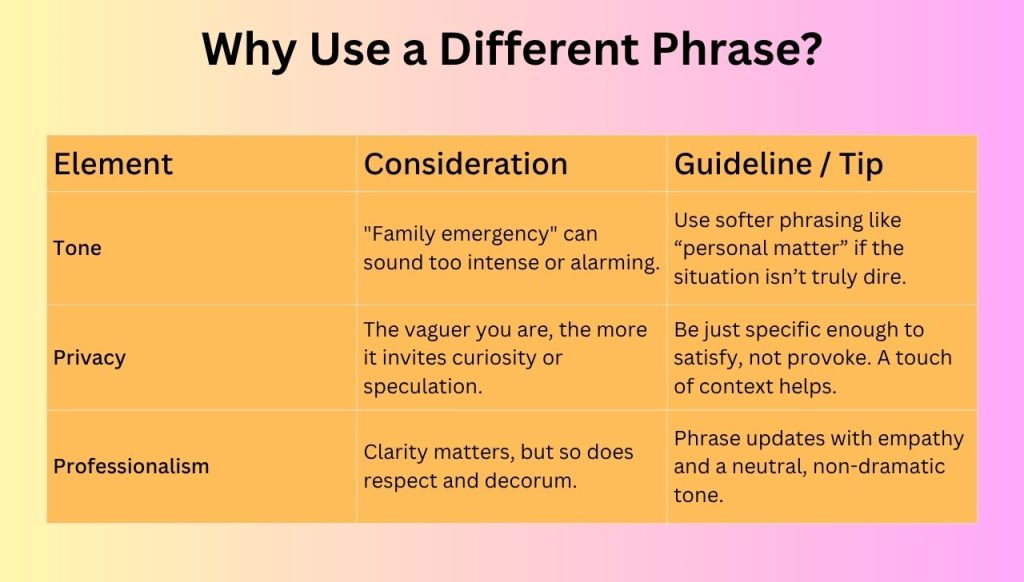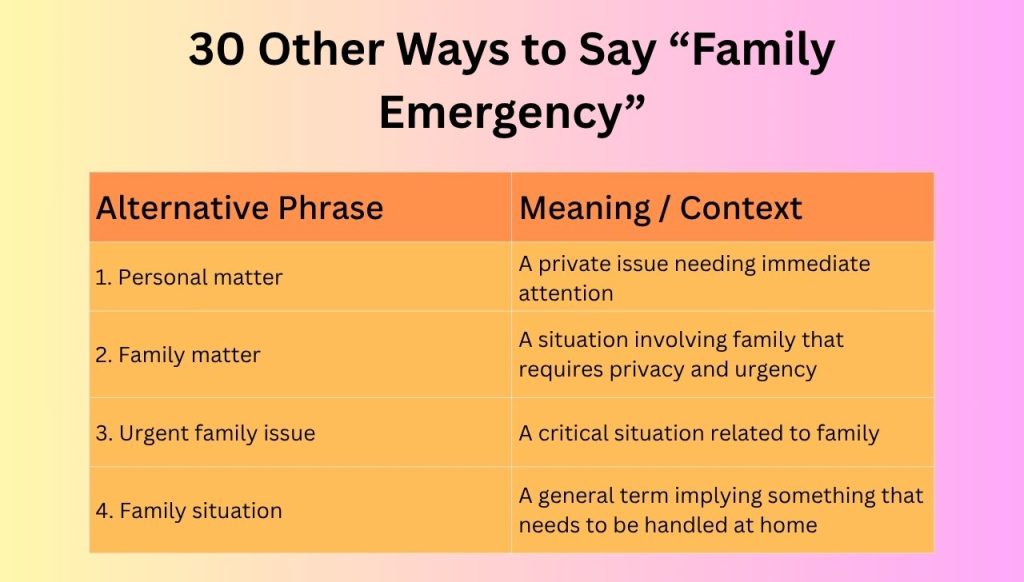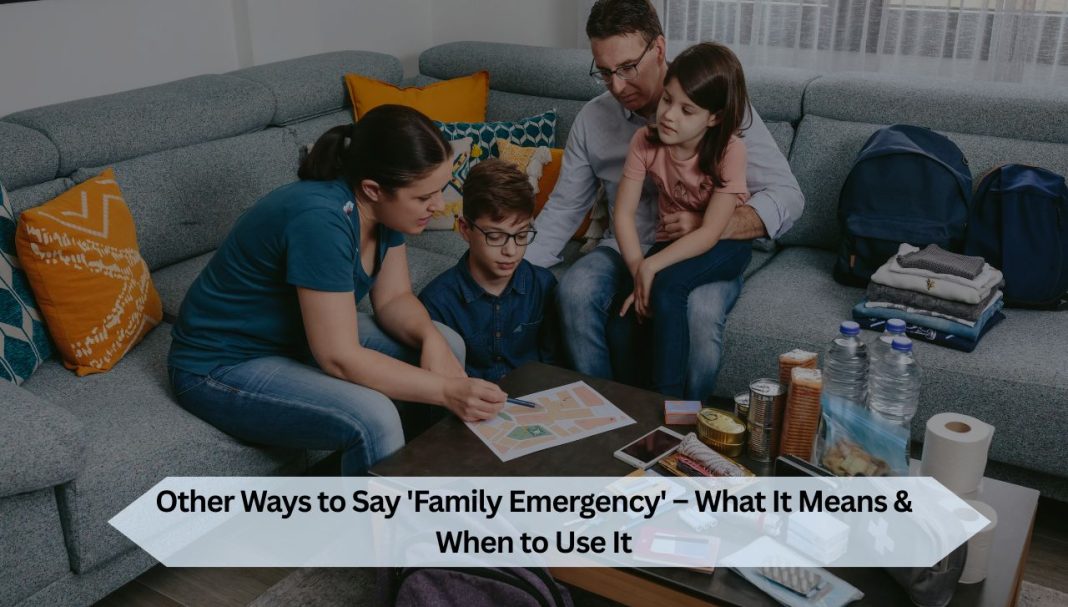Life happens. Things go sideways. And when it involves your family, you drop everything. You cancel plans. You call out of work. You handle it. Most of the time, we say, “It’s a family emergency.” Those two words do the job. They’re vague enough to keep things private. Strong sufficient to explain why you’re suddenly gone.
But here’s the thing. You don’t always need to say it that way. Sometimes it sounds too heavy. Other times, it’s not specific enough. And let’s be real—saying it too often can raise eyebrows.
That’s why having other ways to say it helps. Different tones for different people. Some more personal. Some more formal. Some just… softer. Let’s talk about what a “family emergency” means. When to say it. Why you might say something else. And most importantly—30 better ways to say it, depending on the situation.
Dive Deeper : 30 Creative Alternatives to ‘Looking Forward to Seeing You’
What Does “Family Emergency” Mean?
It sounds big. But it covers a lot of ground. A family emergency could mean:
- Someone’s sick
- Someone got hurt
- A child care problem popped up
- A parent needs help
- There’s a mental health crisis
- There’s trouble at home
It doesn’t have to be life or death. It counts if it affects your ability to focus, show up, or do your job. What matters is that someone close to you needs your time and attention. Now.
When to Use “Family Emergency”
Use it when you need to leave or reschedule. That’s it. It’s short. It’s serious. And people usually won’t press for details. You might say it when:
- You call out of work
- You cancel a meeting
- You reschedule a doctor’s appointment
- You miss a deadline
- You pull out of a trip
But there’s a catch. It can sound dishonest if you use it for things that aren’t urgent—or aren’t really about family. People start to question it. You don’t want that. That’s why it’s smart to switch it up now and then. Say what you mean, but say it in a way that fits.

Why Use a Different Phrase?
So, why say anything else? Because not every family issue is an emergency. And not every emergency needs to sound dramatic. Here are a few reasons to choose a different phrase:
| Element | Consideration | Guideline / Tip |
|---|---|---|
| Tone | “Family emergency” can sound too intense or alarming. | Use softer phrasing like “personal matter” if the situation isn’t truly dire. |
| Privacy | The vaguer you are, the more it invites curiosity or speculation. | Be just specific enough to satisfy, not provoke. A touch of context helps. |
| Professionalism | Clarity matters, but so does respect and decorum. | Phrase updates with empathy and a neutral, non-dramatic tone. |
| Clarity | Don’t label something an emergency if it’s not. | Say “unexpected situation” or “personal obligation” when urgency isn’t extreme. |
The goal is simple. Say what you need to say. Be honest. Be brief. Don’t open the door to more questions than required.

30 Other Ways to Say “Family Emergency”
| Alternative Phrase | Meaning / Context |
|---|---|
| 1. Personal matter | A private issue needing immediate attention |
| 2. Family matter | A situation involving family that requires privacy and urgency |
| 3. Urgent family issue | A critical situation related to family |
| 4. Family situation | A general term implying something that needs to be handled at home |
| 5. Domestic emergency | An emergency occurring in or involving the household |
| 6. Family obligation | A duty or responsibility that involves family |
| 7. Personal crisis | A serious personal situation (can imply mental, emotional, or family-related) |
| 8. Household issue | A problem at home needing attention |
| 9. Immediate family concern | A pressing issue involving close family members |
| 10. Private emergency | A non-specific but serious issue, implying a need for discretion |
| 11. Critical family event | A significant or urgent event involving family |
| 12. Time-sensitive family matter | A family issue that requires immediate resolution |
| 13. Personal leave for family reasons | Taking time off due to family-related causes |
| 14. Sensitive family situation | A delicate or emotional situation involving family |
| 15. Family-related situation | A broad, neutral way of stating something happened within the family |
| 16. Urgent personal obligation | An unspecified urgent commitment outside of work |
| 17. Emergency at home | An urgent situation in your household |
| 18. Family health concern | A health-related issue involving a family member |
| 19. Private family concern | A serious but unspecified issue involving a family member |
| 20. Sudden family need | A recent, unexpected situation requiring attention |
| 21. Family support situation | Needing to assist or support a family member |
| 22. Domestic responsibility | A duty or obligation at home |
| 23. Family emergency situation | A more formal way to say “family emergency” |
| 24. Urgent domestic concern | An immediate issue related to home or family |
| 25. Personal emergency | A non-specific way to say you’re dealing with something urgent |
| 26. Family crisis | A serious, sometimes ongoing problem involving family |
| 27. Pressing family obligation | An important and immediate family-related duty |
| 28. Home emergency | An urgent situation happening at your residence |
| 29. Immediate personal concern | A broad term for something needing urgent personal attention |
| 30. Family-related emergency | A slightly more formal or specific version of “family emergency” |
Dive Deeper : 30 Ways to Say “Please Note” Differently
Conclusion
You don’t always need a perfect phrase. But you do need the right one. Something that fits the moment. Something that helps people understand—but doesn’t invite too many questions.
“Family emergency” will always be there when you need it. But if you want something less heavy, clearer, or just a little more you—you now have 30 options. Use what fits. Be honest. Keep it simple. And take care of what matters most. Because when your people need you, nothing else should come first.

Grammar Nerd, ESL Trainer, Low-Key Comma Crusader
Daniel has taught English for over a decade, from small community classes in Oaxaca to bustling university halls in London. He has a knack for turning even the driest grammar points into relatable, real-life language tools—think fewer red pens, more real talk. He co-founded Grammation to make grammar less gatekeeper-y and more global. When he’s not decoding sentence structures, he’s probably hiking with a paperback novel or adding unnecessary hyphens for fun.
“The rules of grammar should empower people—not trip them up.”


